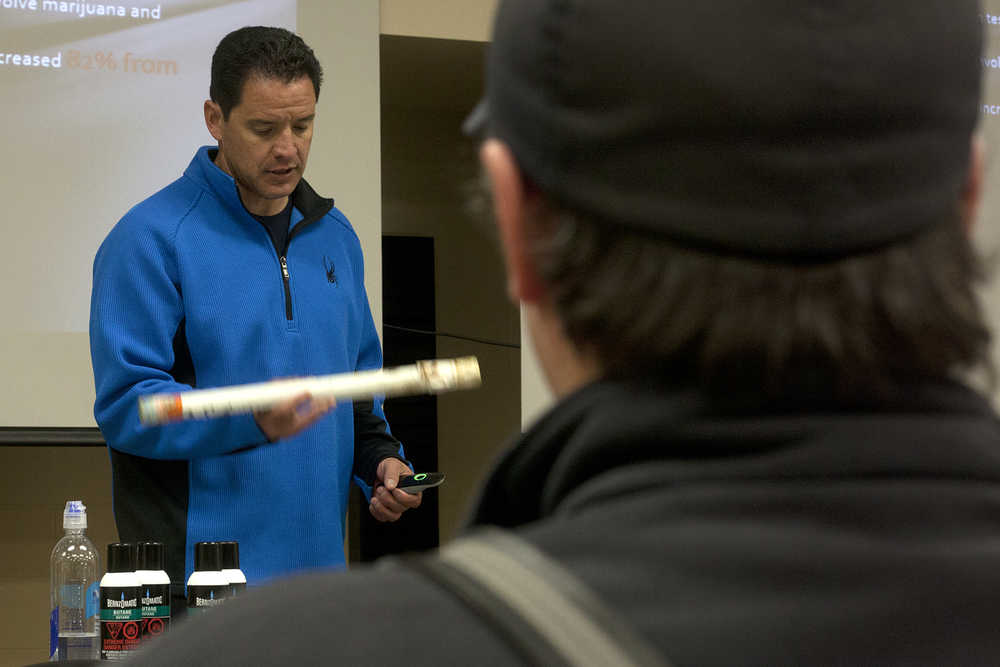Central Kenai Peninsula firefighters received a crash course on a rising problem seen in Colorado since the legalization of marijuana — butane hash oil explosions.
Chief Fire and Explosive Investigator Siegfried Klein with the Aurora, Colorado Fire Department has spent the last few days in Alaska educating first responders on the hazards associated in butane hash oil explosions.
On Tuesday Klein was in Anchorage to demonstrate the dangers of hash oil explosions to firefighters with a simulation at the Fire Training Center. He warned firefighters at the Central Emergency Services Office of Emergency Management Wednesday on what could occur in the area if Ballot Measure 2 passes on Nov. 4.
If the marijuana initiative passed, Alaska would be the third state behind Washington and Colorado to legalize recreational marijuana use for adults 21 years old and above. The language in the initiative is similar to the Colorado law passed in 2012 that took effect in January.
Since marijuana was legalized in Colorado, firefighters across the state have seen 26 explosions resulting in 27 injuries from home production of butane hash oil. Klein said all of the hash oil explosions happen at marijuana grow houses and most have occurred in the Aurora area, a suburb outside of Denver.
Hash oil is made by dissolving marijuana leaves in butane, then cooking it to extract oil and resin, which has a high concentration of THC, the active chemical component in marijuana. Since butane is easily combustible and the process involves heat and alcohol, the explosion risk is high, he said.
Klein said as a fire investigator with 21 years of experience in law enforcement and firefighting, he didn’t know anything about hash oil until they started to put cases together earlier this year and research the process. He has responded to scenes with extensive house damage with studs, walls and windows blown off the frame. He said the damage is similar to a meth lab explosion.
“I have come on scene and where a guy is outside his apartment dripping skin saying, ‘I blew myself up,’” Klein said. “Nobody knew what was going on.”
He said if firefighters respond to a freezer appliance explosion, it is a hash oil process called winterization. Pressure cookers and tubes that look like pipe bombs have also been used to make hash oil, he said.
Klein said hash oil has become a lucrative process for home extractors to sell underground.
Klein said it is important to educate responders to some of the incidents he has come across. Two ignited cans of butane can go from 90 degrees to 2300 degrees in six-tenths of a second, he said.
“Be safe out there and recognize what you are walking into,” he said. “Remember a butane can has pockets and just because one explosive went off doesn’t mean another pocket hasn’t ignited. It is a flash fire so bunker gear should protect you but your gear can be compromised.”
Klein provided the Aurora Fire Department operating procedure for hash oil explosions. The first step is to secure electricity, turn off the gas meter, and ventilate the structure to let gas out. Then treat any patients and extinguish the fire. Once the fire is out firefighters are told not to touch extraction devices and call the arson investigator.
CES paramedic Reed Quinton said Klein’s presentation was informative because it is nothing that the department has come across.
“It’s important to know what to look for in case we do experience this because it’s an additional hazard for us if we are not aware,” he said.
CES Fire Chief Chris Mokracek said butane hash oil explosions are something he hadn’t been familiar with and by hearing from an investigator that has first-hand knowledge of the potential hazards would help them be proactive if marijuana is legalized in Alaska.
“I was surprised how simple it is to make with household items,” he said. “The process is dangerous and he gave us some things to be aware and conscious so we can make sure nobody gets hurt.”
Reach Dan Balmer at daniel.balmer@peninsulaclarion.com.

